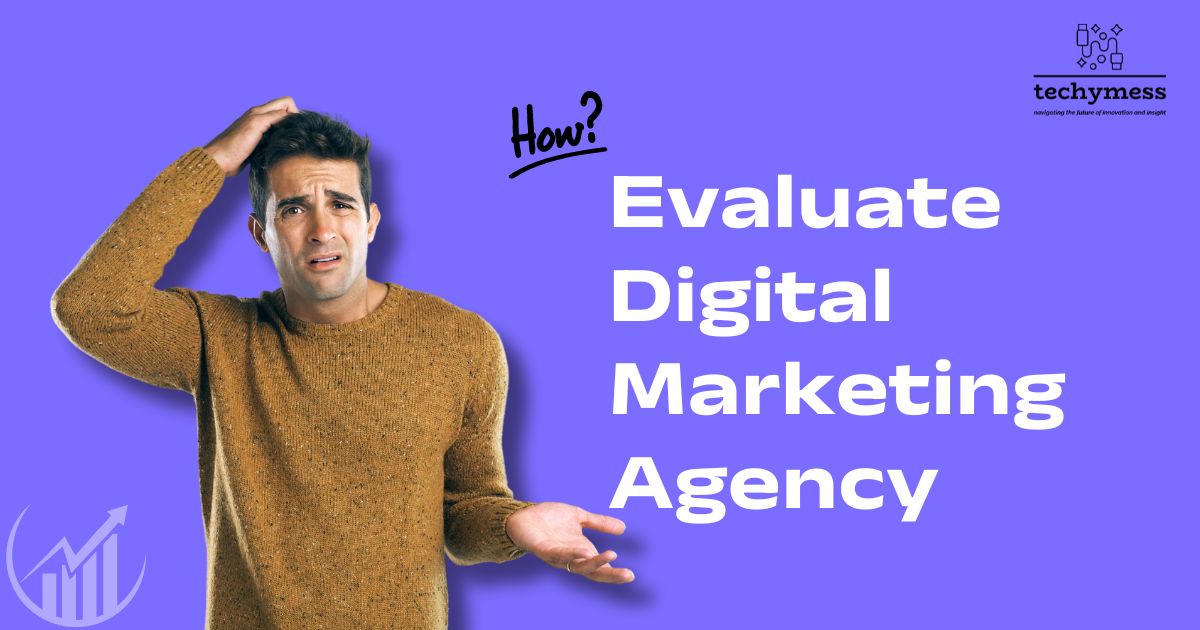In the ever-evolving digital marketing landscape, mastering “How to Evaluate a Digital Marketing Agency” is pivotal for businesses seeking online prosperity. This introduction emphasizes the critical importance of making informed choices when aligning with a digital marketing agency. As we delve into the intricacies of this decision-making journey, let’s uncover the key factors that demand meticulous consideration. By comprehending the profound significance of this choice, organizations can strategically position themselves for unparalleled success in the dynamic and fiercely competitive digital space. The journey to success commences with adeptly understanding “How to Evaluate a Digital Marketing Agency” and making a reasonable selection.
Table of Contents
Understanding the Role of Digital Marketing Agency or Company

As part of your marketing journey, you must appreciate the vital role a digital marketing agency/company can play in shaping your strategy. A comprehensive agency should go beyond a simple service provider label, offering everything from SEO and social media management services to approaches to strengthening your brand’s online presence.
Digital marketing agencies serve more than simply as service providers; they serve as growth triggers for small and mid-sized enterprises seeking to thrive online. A good agency will boast expertise across various digital marketing types, such as search engine optimization (SEO), pay-per-click (PPC), content marketing management, social media management, email marketing, and conversion rate optimization.
An agency’s hallmark lies in its capacity to quickly adapt to the ever-evolving field of digital marketing, consistently applying innovative methodologies and cutting-edge strategies. A top-tier agency doesn’t simply complete tasks for you – instead, it helps establish meaningful connections between brands and audiences while providing valuable analytics-based adjustments with tangible returns on marketing investments – effectively acting as your partner to help propel them further within this dynamic digital environment.
Core Functions of a Digital Marketing Agency
- Strategic Development of Comprehensive Digital Marketing Plans:
Crafting effective digital marketing plans is a digital marketing agency’s cornerstone. This involves a strategic and comprehensive approach to aligning marketing objectives with the unique characteristics and goals of the business. From defining target audiences to selecting the most suitable channels, this function ensures a roadmap for success.
- Execution of Multi-Channel Campaigns to Maximize Reach and Engagement:
A pivotal function of a digital marketing agency is the execution of multi-channel campaigns. This encompasses deploying marketing strategies across various online platforms to ensure maximum reach and engagement. From social media to search engines and beyond, the agency coordinates and implements campaigns that resonate with the target audience, fostering increased brand visibility and interaction.
How to Evaluate a Digital Marketing Agency

Selecting the right business partner is a strategic imperative when elevating your digital footprint. Here’s a systematic approach to evaluating a full-service digital marketing agency, ensuring an ideal fit for your company’s unique needs.
- Reputable & Trustworthy:
Choose an agency committed to industry excellence, showcasing expertise through thought leadership, industry publications, and contributions to professional forums. Evaluate reputation through engagement with the marketing community, client testimonials, and transparent communication practices, ensuring they position themselves as strategic growth partners.
- Assessing an AAgency’sTrack Record:
Review the agency’s portfolio and case studies online, depicting the breadth of their work and problem-solving abilities. During conversations, request detailed case studies emphasizing content creation, SEO/SEM, and paid advertising prowess. Tangible results for previous clients serve as a measure of their success and versatility.
- Analyzing Communication and Reporting:
Scrutinize the agency’s approach to building a marketing strategy and project plan. A good agency outlines its engagement model, detailing dedicated resources, interaction frequency, and marketing automation tools. Ensure proposals align with your objectives, and look for an agency that treats you as a partner, aiding your team in seamlessly utilizing tools and best practices.
- Evaluating Tools and Technologies:
Examine the agency’s tools and technologies, particularly in the context of a rapidly evolving marketing landscape. Agencies leveraging state-of-the-art resources, including artificial intelligence (AI), can offer innovative solutions. AI, for instance, transforms customer segmentation, personalised experiences, optimizes campaigns, and predicts trends.
- Considering Agency Culture and Values:
Align your company with the culture. A compatible agency respects and amplifies your brand’s voice while providing a fresh perspective. A sound partnership should promote open communication, mutual respect, and shared goals, acting as an extension of your in-house team.
- Decoding Pricing and Value:
Demand transparency in pricing structures and clear articulation of the value the agency aims to deliver. Compare costs against potential return on investment (ROI), ensuring your marketing budget translates into tangible outcomes. Understand different pricing models agencies offer and choose based on alignment with your objectives and budget, prioritizing long-term cost-effectiveness over immediate affordability.
Key Trends Impacting Digital Marketing

Understanding pivotal trends in digital marketing is essential when selecting an agency equipped to navigate current and future landscapes. Here’s a comprehensive list of noteworthy trends to consider:
- Artificial Intelligence (AI) and Machine Learning:
As AI evolves, agencies must harness AI-powered tools for predictive analytics, personalization, and process automation to stay at the forefront of digital marketing innovation.
- Voice Search Optimization:
With the rise of voice-enabled devices, agencies need to optimize content for voice search, ensuring brands maintain visibility in this increasingly prevalent mode of interaction.
- Video Content and Live Streaming:
The surging demand for video content, especially live streams, necessitates agencies to excel in crafting compelling and engaging video strategies to captivate audiences effectively.
- Data Privacy and Security:
Stringent regulations like GDPR underscore the importance of agencies’ profound understanding of data privacy laws. Compliance with these regulations is paramount in shaping effective and ethical marketing strategies.
- Ephemeral Content & Stories:
Short-lived content formats, exemplified by Stories on various platforms, have become integral to social media strategies. Agencies should exhibit expertise in leveraging these ephemeral formats to connect with audiences authentically.
- Interactive and Immersive Experiences:
Differentiating a brand in the digital space requires agencies to engage customers through immersive experiences like virtual reality (VR), augmented reality (AR), and interactive content, offering a unique and memorable brand interaction.
- Sustainability and Ethical Marketing:
With heightened consumer awareness of environmental issues, agencies should incorporate sustainability into marketing campaigns, aligning with ethical principles to resonate with conscious consumers.
- Influencer Marketing:
Leveraging influencers in niche markets is a potent strategy, but agencies need to manage it with a focus on authenticity and alignment with brand values. Crafting genuine partnerships can enhance the effectiveness of influencer marketing initiatives.
Establish Goals and Fine-Tune Objectives
Before engaging a digital marketing agency, it is crucial that you establish specific, performance-driven goals you wish to attain with their help. From SEO services to comprehensive plan development needs, align your goals with their expertise. Make certain your objectives are SMART (specific, measurable, achievable relevant timebound). Doing this provides a concrete way of measuring success over time and will give an accurate measure of progress and success.
Developing Your Criteria for Assessing Agencies

This comprehensive checklist offers a quick overview of the essential considerations for choosing the ideal digital marketing agency for your business.
- Digital Marketing Expertise
- Demonstrated proficiency in SEO, PPC, content marketing, and social media for small businesses.
- Application of AI and machine learning in marketing strategies.
- Strategies for compelling video content creation.
- Cultural Fit
- lignment with your company’s values and preferred work style.
- Transparent communication and a collaborative approach.
- Tools and Technology
- Utilization of current and advanced marketing tools and analytics platforms.
- Proficiency in omnichannel marketing tools and customer relationship management.
- Portfolio and Track Record
- Diverse portfolio showcasing successful campaigns.
- Case studies provide tangible results and ROI.
- Communication and Reporting
- Detailed insights into the agency’s engagement model and reporting practices.
- Willingness to educate and seamlessly integrate tools with your team.
- Pricing and Value
- Transparent pricing models with a clearly outlined scope of work.
- Cost-effectiveness assessed against potential ROI and added value.
- Understanding of Trends
- Insight into leveraging current trends for marketing success.
- A proactive approach to adapting strategies based on forecasted economic and digital changes.
Investigating Digital Footprints – Unveiling the Agency’s Online Presence

- Exploring Agency Websites and Portfolios:
- Homepage and Navigation: Start by analyzing the agency’s website. Look for a clear value proposition, services offered, and easy navigation.
- Portfolio Section: Check the portfolio section to see the range of industries they have worked with and the diversity of their campaigns.
- Case Studies: Dive into case studies for specific examples of their work. Assess the objectives, challenges, strategies, and results of these campaigns.
- Client List: Take note of the agency’s client list. Recognizable brands or businesses in your industry indicate relevant experience.
- Reading Client Testimonials and Reviews:
- Testimonials on Website: Read testimonials provided on the agency’s website. Look for specifics about the services offered and the impact on the client’s business.
- External Reviews: Explore third-party review platforms like Google My Business, Clutch, or Yelp for unbiased opinions from clients.
- Industry Forums: Check industry-specific forums or communities for discussions about the agency. This can provide insights into the experiences of other businesses similar to yours.
- Analyzing the Agency’s Own Digital Presence:
- Website: Scrutinize the agency’s website. Is it visually appealing and user-friendly, and does it reflect the latest design trends? A well-maintained website can indicate the agency’s attention to detail.
- Social Media Presence: Evaluate the agency’s activity on social media platforms. Look for engagement, frequency of posts, and the quality of content shared.
- Content Marketing: Examine the agency’s blog or content section. Regular, relevant, and valuable content showcases their industry knowledge and commitment to staying updated.
- SEO Performance:
- Google Ranking: Search for the agency on Google. A well-optimized agency should appear prominently in search results.
- Keyword Strategy: Assess the use of keywords in their content. An effective keyword strategy can indicate a strong understanding of SEO principles.
- Consistency Across Platforms:
- Branding Consistency: Check for consistency in branding across various platforms. Inconsistencies may raise questions about attention to detail.
- Messaging: Evaluate the agency’s messaging across different channels. Consistent messaging contributes to a coherent brand image.
Decoding Transparency and Communication Excellence
Transparency and effective communication are central to the evaluation of digital marketing agencies. This section of agency evaluation delves into analyzing an agency’s communication style, verifying transparency in reporting and analytics, and their approach to handling client feedback and revisions. Discover key factors that define reliable partnerships when conducting agency assessments.
Navigating the Financial Landscape of Digital Marketing Agencies
Investing in a digital marketing agency is a strategic move for businesses aiming to boost their online presence and drive growth. However, decision-making involves carefully considering budget and pricing factors to ensure a mutually beneficial partnership. In this section, we’ll explore critical aspects related to budgeting and pricing when evaluating digital marketing agencies.
- Discussing the Agency’s Pricing Structure and Payment Models:
Understanding how an agency structures its pricing and payment models is fundamental. Agencies often adopt various pricing models, such as:
- Hourly Rates: Agencies may charge based on the number of hours dedicated to your project. This model is suitable for projects with variable workloads.
- Project-Based: A fixed fee is established for the entire project, clarifying costs from the outset.
- Performance-Based: Some agencies tie their compensation to the performance of the campaigns, aligning their success with yours.
Discussing and agreeing upon the most suitable model based on your project scope, goals, and budget is essential.
- Ensuring the Budget Aligns with Your Business’s Financial Capacity:
Aligning the agency’s proposed budget with your business’s financial capacity is critical for a sustainable partnership. Consider the following steps:
- Clearly Define Your Budget: Clearly understand the budget you’re willing to allocate to digital marketing efforts. This should encompass the overall campaign, including agency fees, advertising spending, and additional costs.
- Evaluate ROI: Assess the potential return on investment (ROI) associated with the proposed budget. A higher budget might yield more significant results, but it should align with your business goals and financial capabilities.
- Negotiate and Discuss: Feel free to negotiate terms that fit your budget. Agencies may be open to adjusting their offerings to accommodate your financial constraints.
- Clarifying Any Hidden or Additional Costs:
Transparent communication is vital to a successful client-agency relationship. When discussing pricing with a digital marketing agency, it’s crucial to address any potential hidden or additional costs:
- Scope of Work: Clearly define the scope of work covered by the proposed budget. This avoids misunderstandings and ensures that both parties are on the same page regarding deliverables.
- Third-Party Expenses: Inquire about third-party expenses that may not be explicitly stated in the initial proposal. These could include software licenses, advertising platform fees, or other miscellaneous costs.
- Revisions and Ongoing Support: Understand how modifications and ongoing support are handled. Some agencies may include a certain number of changes in their pricing, while others might charge additional fees.
By thoroughly discussing the agency’s pricing structure, aligning the budget with your financial capacity, and clarifying potential hidden costs, you can establish a transparent and financially sustainable partnership with a digital marketing agency that best meets your business needs.
Also read our article: How to Market Digital Products Effectively
Conclusion: How to Evaluate a Digital Marketing Agency
Finding the right digital marketing agency can feel like navigating a jungle – confusing and overwhelming. That’s why we created this guide, your roadmap to “How to evaluate a Digital Marketing Agency” for your business.
We delve into everything you need to know, from understanding what a digital marketing agency does to verifying its track record and staying in sync on budget. Trust is critical, so look for agencies with stellar reputations and open communication. Remember, the digital landscape is constantly changing, so finding an agency that embraces new trends is crucial.
By following these steps, you’ll be well on your way to finding the perfect agency that propels your digital presence to new heights. Don’t just settle for any agency – choose wisely because your success starts with the right fit!


1 Comment
Comments are closed.